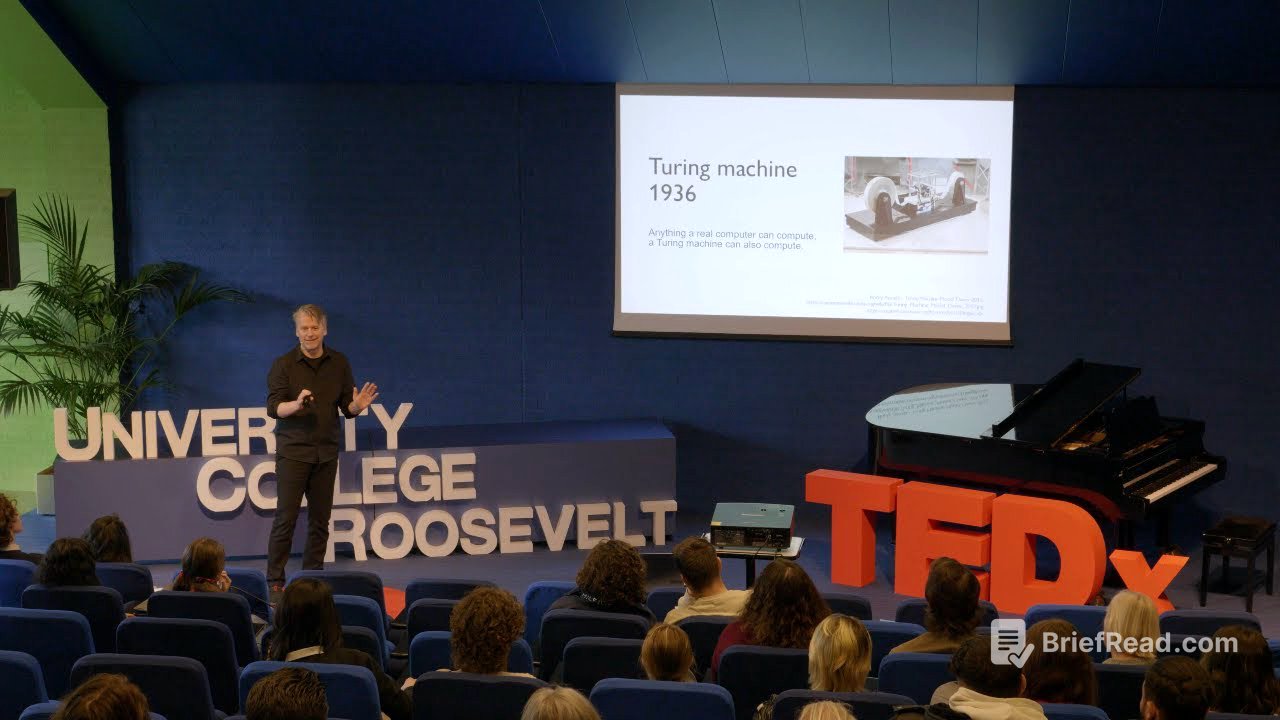TLDR;
The speaker explores the concept of consciousness in relation to artificial intelligence (AI). He starts with a personal anecdote about a Depeche Mode concert to illustrate subjective experience. He then discusses the definition of AI, its applications, and the limitations of current AI systems in achieving consciousness. The talk touches upon the Turing test, the difference between human and AI creativity, and concludes with a cautionary note about potential ethical issues if AI were to become conscious.
- Subjective experience is key to understanding consciousness.
- Current AI systems are not conscious.
- Ethical considerations arise if AI becomes conscious.
Depeche Mode Concert and the Definition of Consciousness [0:03]
The speaker reminisces about attending a Depeche Mode concert in Budapest in 1988, describing it as a profound, almost transcendent experience. This personal story serves to highlight the subjective nature of consciousness. He mentions that defining consciousness is a challenge, with over 200 definitions proposed in a recent paper. For the purpose of the talk, he adopts a simple definition: consciousness as subjective experience, which resonates with his concert memory.
AI Winters and Summers: What is AI? [2:48]
The speaker then shifts to discussing AI, noting that in 1988, AI was in a "winter" stage, a period of reduced interest and funding due to a lack of significant progress. He explains that AI winters are often followed by periods of renewed interest and advancement, like the current "AI summer." Defining AI is complex, often requiring extensive study. He simplifies it with the mantra "maximize your expected utility," which means achieving the best solution in a probabilistic environment to measure performance.
Theoretical vs. Applied AI and the Turing Machine [5:07]
The speaker argues that while theoretical AI is fascinating, its practical applications are what make it significant. He points to the Nobel Prize in Physics being awarded to computer scientists for their contributions to artificial neural networks as evidence of AI's impact. He then introduces the concept of computers as machines that perform calculations on stored data, referencing Alan Turing's groundbreaking work on the Turing machine. The Turing machine, despite its simplicity, is theoretically capable of computing anything a real computer can, which is a visionary and amazing fact.
Algorithms and the Question of Programmed Consciousness [8:04]
The speaker explains that computers execute algorithms, which are finite sequences of mathematically rigorous instructions. He clarifies that algorithms are not simply recipes, as recipes often lack precise definitions. He poses the question of whether it's possible to create an algorithm that programs consciousness, answering with a no. His argument is that executing the same program on different computers will yield the same result, lacking the subjective experience inherent in consciousness.
The Turing Test and Verbal Interaction [9:56]
The speaker discusses Alan Turing's other significant contribution: the Turing test, designed to measure a machine's intelligence through verbal interaction. The test involves determining whether one is communicating with a computer or a human. He notes that AI research is not primarily focused on creating machines that pass the Turing test. He draws a parallel between the Turing test's reliance on verbal interaction and how we assess consciousness in others by asking questions about their feelings and experiences.
What is it Like to Be a Machine? [11:33]
The speaker addresses the title of his talk, "What is it like to be a machine?" He reveals that it's a play on Thomas Nagel's famous paper, "What is it like to be a bat?" He checked to see if the phrase was original and found only a few hits, mostly related to "what is it like to be a machine learning engineer." He highlights the difference between generative AI, like ChatGPT, which learns from the internet, and humans, who possess creativity and knowledge independent of the internet, similar to animals.
Conclusion: AI Consciousness and Ethical Considerations [13:55]
In conclusion, the speaker asserts that current AI systems are not conscious and are unlikely to become so with existing algorithms. However, he cautions against complacency, noting that technological advancements could surprise us. He uses the example of the Wright brothers and a New York Times article that deemed flying machines impossible shortly before their invention. He raises ethical concerns about the potential implications of conscious AI, such as the responsibility to care for their well-being. He ends by dedicating the talk to his mother and aunt.









